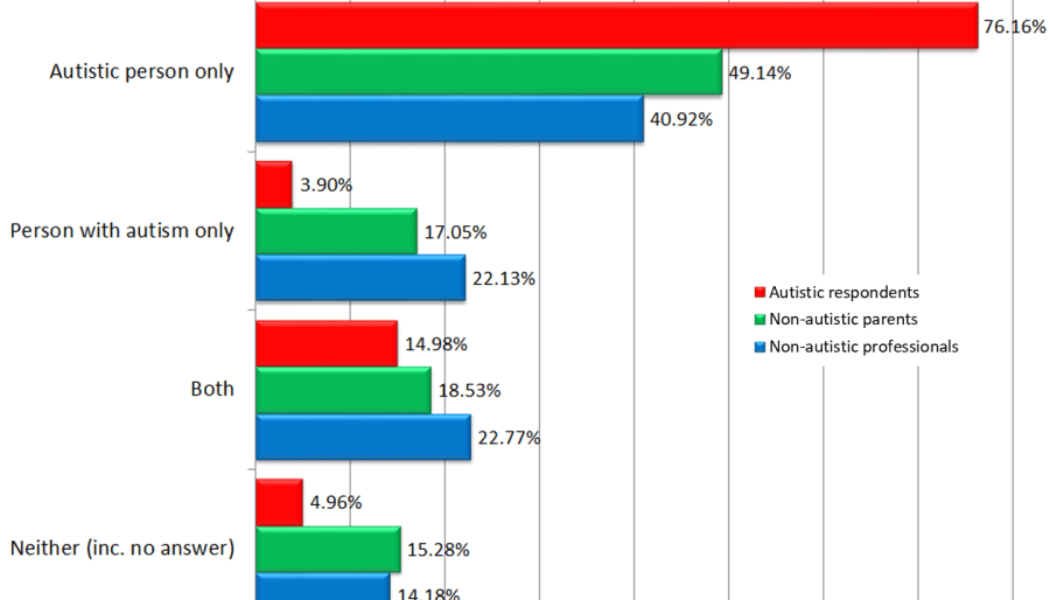In the autistic community, there has long been a debate about how to refer to ourselves. Historicaly, medical professionals have often preferred “people with autism” while most of us prefer “autistic.” I personally – like the vast majority of autistics – prefer “autistic.” I wrote about this in 2019 using survey data then, but I need to update it with newer survey data. One site reran the same survey and the results were even more dramatically in favor of “autistic.” I will review my 2019 piece and then look at the new survey. I will conclude with the point that we should avoid “with autism” in Christian ministry.
The shift towards preferring autistic is dramatic. Autistics already preferred “autistic” to “with autism,” but the ratio jumped four-fold. Parents and professionals used to prefer “with autism” but have both flipped.
Notes: (1) Person-first (“with autism”) and identity-first (“autistic”) refer to the same distinction. These terms can be helpful talking across a variety of conditions but not as much with one condition. Thus, I just use “autististic” / “autistic person” or “with autism.” (2) Some refer to an “autistic person” while others just use “autistic” – I will treat these as the same. Autistic is primarily an adjective but can become a noun when the noun becomes obvious. It is similar to a nationality: I’m a “Canadian man,” but also a “Canadian.”
My 2019 Piece on “Autistic” not “With Autism”
In October 2019, I wrote “Christians, Please Call Us Autistic, Blind, and Deaf”:
When I have posted about autism, I occasionally have had an argument about terminology. I am autistic. Occasionally a concerned person will tell me that I should call myself someone “with autism.” I’d really prefer you use “autistic” (identity-first language) but can live with you using “with autism” (person-first language). Nobody diagnosed with autism spectrum disorder has ever told me that my language is wrong but only those from outside. In fact, surveys repeatedly show that a decent majority of us prefer “autistic” over “person with autism.”
Most in the disabled community do prefer person-first language and it is the current norm in professional settings. But, we autistics, along with the Deaf and blind, tend to prefer identity-first language. […]
Being a person “with autism,” sounds like it is a backpack or hairstyle, something external that I can leave from time to time. However, I am never not autistic. […]
Secondly, all three of these disabilities also have advantages where our brains build other capacities better… Before I was diagnosed, my nickname was “Schneider-pedia,” which indicates an above-average grasp and knowledge of facts. Such memory is a trait common in autism. […]
As Christians, Jesus teaches that charity is the first commandment. Pope Francis emphasizes, “Meet[ing] others where they really are.” If the overwhelming majority of those who have a diagnosis of autism want to be called “autistic,” that seems part of charity and meeting us where we are. […]
Finally, identity-first language helps you see the good in our condition along with the challenges.
Read a fuller explanation there if you want.
Surveys linked in the piece
In that piece, I linked 4 surveys. Three were primarily of autistic people while the last covered three groups.
| Source | Prefer “autistic” | Both/Neither | Prefer “with autism” |
| Autism Speaks Facebook | 69% | not an option | 31% |
| Mendability | 56% | 19% | 25% |
| Autism Speaks Twitter | 91.5% | not an option | 18.5% |
| Autistic Not Weird [autistic responses] | 51.6% | 36.6% | 11.8% |
| Autistic Not Weird [non-autistic family responses] | 22.7% | 41.1% | 36.2% |
| Autistic Not Weird [non-autistic professional responses] | 13.0% | 36.8% | 49.2% |
That final survey by Autistic Not Weird is the one that was repeated, so it gives us a comparison sample over time.
New Survey on “Autistic” or “With Autism”
Autistic Not Weird repeated the survey with similar questions and groupings now in 2022. Let’s look at the results.
I will take a graphic from this survey to show the current results, then add a bit of commentaryont he changes. The survey has some interesting results for other terms like “ASD” or “high/low support needs,” and other topics not about language, but I will just focus on these two.
First, here are the numbers in a bar graph:

The ratio of autistics preferring “autistic person” exclusively to “with autism” exclusively went up dramatically. (for this I am ignoring responses of both and neither to simplify things.) In 2018, 4.4 autistics preferred “autistic person” for every autistic who preferred “with autism.” In 2022, that ratio is 19.5 autistics preferring “autistic person” for every autistic preferring “with autism.”
At the same time, the non-autistic responses flipped.
| Source | Prefer “autistic” | Both/Neither | Prefer “with autism” |
| non-autistic family responses 2018 | 22.7% | 41.1% | 36.2% |
| non-autistic family responses 2022 | 29.1% | 33.8% | 17.1% |
| non-autistic professional responses 2018 | 13.0% | 36.8% | 49.2% |
| non-autistic professional responses 2022 | 40.9% | 37.0% | 22.1% |
If we ignore the both/neither response, then family members went from preferring “with autism” by 13.5% to preferring “autistic” by 12%. That is a shift by 25.5%. The shift in professionals is even more dramatic. They went from preferring “with autism” by a margin of 36.2% to preferring “autistic” by a margin of 18.8%. That is a shift of 55%! In other words, over half of these professionals went from using just “with autism” to using just “autistic.” That is a monumental shift.
Conclusions
All the reasons I gave back in 2019 still apply. New data makes part of their logic even stronger. We should use “autistic” throughout Christian ministry due to the strong preferences. If we come across a particular person who still prefers to say they are “with autism,” I would fully use that for them, but given the ratio of autistics preferring it is almost 20:1, I doubt this will be common. Even most parents and professionals have come to see this as the standard now, so let’s go forward with autistic ministry or ministry to autistics.
Join Our Telegram Group : Salvation & Prosperity










